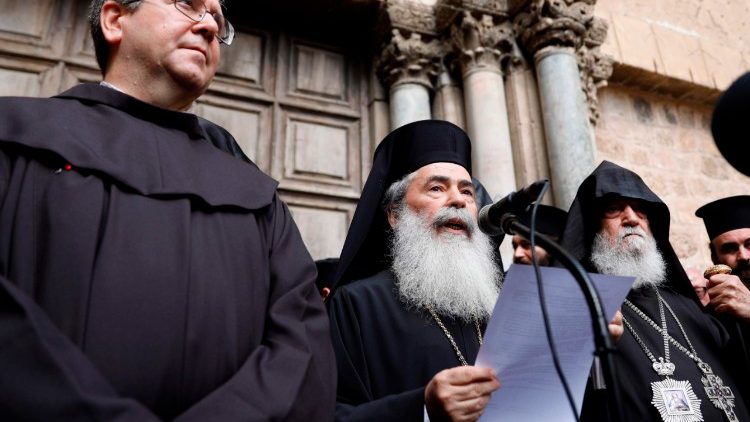Churches and Israel, new clash over taxes. Christian leaders: status quo violated
In a letter addressed to Prime Minister Netanyahu patriarchs and Church leaders protest the decision of several municipalities to impose the Arnona. The dispute concerns Tel Aviv, Ramle, Nazareth and Jerusalem. The leaders express "deep concern": just as the world is following the ongoing conflict with apprehension, intolerance towards the Christian presence in the Holy Land is growing.
Jerusalem (AsiaNews) - In the shadow of the conflict in Gaza, there are numerous fronts of tension and confrontation within Israel, from the escalation of attacks by Jewish settlers in the Palestinian Territories to the "war" on property taxes (and not) with the Christian denominations of the Holy Land.
This long-standing problem has recently registered a new chapter: the heads of the various Churches in Jerusalem have signed a document in which they express their firm opposition to the municipality's decision to impose municipal taxes (Arnona) on the property of the Churches.
In the joint statement, released yesterday on behalf of the Patriarchs and Christian leaders, the leaders express "deep concern" over the decision, which ends up contradicting "centuries" of historical agreements between the Churches and civil authorities and represents a "coordinated attack" on the Christian presence in the Holy Land by initiating "tax proceedings".
"We declare that such a measure," the Christian leaders state in the document, "undermines the sacred character of Jerusalem and jeopardises the Church's ability to carry out its ministry in this land on behalf of its communities and Churches around the world".
Moreover, in the note patriarchs and leaders underline the "significant contributions" of the various Christian organisations active in Jerusalem, including investments in "schools, hospitals, homes for the elderly and facilities for the disadvantaged".
The civil authorities "have historically recognised and respected" this effort for its valuable contribution to the entire community, including Jews and Muslims.
The church leaders asked the Jerusalem municipality to withdraw the decision and maintain the historically sanctioned status quo. Signing the letter are Card. Pierbattista Pizzaballa, Patriarch of Jerusalem of the Latins; Theophilos III, of the Greek Orthodox Patriarchate; Nourhan Manougian, of the Armenian Apostolic Orthodox Patriarchate; Brother Francis Patton, ofm, Custos of the Holy Land; Bishop Ibrahim Sani Azar, of the Lutheran Evangelical Church in Jordan and the Holy Land; Georges Dankaye', of the Armenian Catholic Patriarchal Exarchate.
The Christian leaders stressed the importance of maintaining the "sacred character" of Jerusalem and "protecting" the churches' ability to carry out the ministries entrusted to them.
The age-old issue of taxes on Christian property in the Holy Land, long the focus of difficult talks between representatives of Israel and the Vatican, is still unresolved. In Israel, places of worship and monasteries are exempt from paying levies and property taxes. However, in recent years, the government and local administrations have equated some ecclesiastical realities that offer board and lodging, especially to pilgrims, to real commercial activities such as hotels, bars and restaurants.
This clashhas seen phases of deep tension, culminating on 25 February 2018 in the decision by the Armenian Patriarch Manougian, the Greek Orthodox Theophilos III and the Custodian of the Holy Land Brother Francis Patton to temporarily close the basilica of the Holy Sepulchre in protest (in the photo: a moment of that protest).
The source of tension was a draft law on the expropriation of land belonging to churches and the request of the then mayor to pay years of taxes, in contravention of status quo agreements. In February last year, the municipality had also blocked the accounts of the (pontifical) Notre Dame Institute in Jerusalem, triggering a further front of confrontation between the parties.
Christians are a tiny minority, less than 2% of the population of Israel and the territories, consisting mainly of Israeli Arabs and Palestinians.
The letter sent to Prime Minister Benjamin Netanyahu this week states that in recent months municipalities in Tel Aviv, Ramle, Nazareth and Jerusalem have issued warning letters or initiated legal action over alleged tax debts. While Israeli officials have tried to dismiss the disagreement as a routine financial matter, the churches say the move upsets the centuries-old status quo and is a reflection of the growing intolerance towards the Christian presence in Israel and the West Bank.
"At this time," they write, "when the whole world, and the Christian world in particular, is constantly following events in Israel, we are once again dealing with an attempt by the authorities to drive the Christian presence out of the Holy Land.
Interviewed by theAssociated Press, the Jerusalem municipality says that the church has not submitted the necessary requests for tax exemption in recent years and "a dialogue is underway to collect debts" related to "commercial properties" in their possession. No comment from the other municipalities.







.png)










